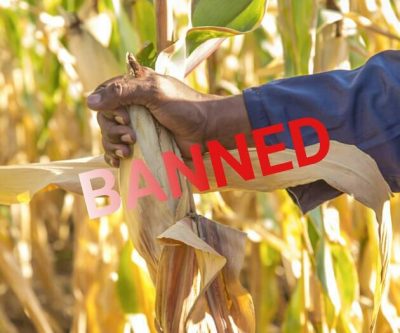Resounding “No” to Monsanto’s “Bogus” GM Drought-tolerant Maize
South Africa minister, appeal board, and biosafety authority reject Monsanto's GM seeds

After more than 10 years of battling Monsanto’s “bogus” drought tolerant maize project, the African Centre for Biodiversity (ACB) has welcomed the decision by the Minister of Agriculture, Ms Thoko Didiza, upholding the decision by the Executive Council: GMO Act and the appeal board to reject Monsanto’s application for the commercial cultivation of its triple-stacked “drought-tolerant” GM maize seed.
This landmark decision is a win for the ACB and other civil society organisations on the continent that have resisted the introduction of these GM varieties in South Africa, Mozambique, Kenya, Uganda and Tanzania.
The Minister’s decision was made following the failure of the GM varieties to increase yield under drought conditions during repeated field trials in South Africa.
The Minister concluded what the ACB and independent biosafety experts have been saying for the last decade: that “the drought tolerance gene in the MON87460 x MON89034 x NK603 maize event did not provide yield protection in water-limited conditions”.
The stacked event, MON87460 x MON89034 x NK603, combines Monsanto’s so-called drought tolerance trait, with their older and increasingly futile herbicide tolerance and insecticidal traits.
Contrary to promises made by Monsanto, yield benefits were inconsistent and in some trials even showed lower yields than conventional maize. The decision also reveals that insect resistance data was insufficient since it came from only one trial site for only two planting seasons.
Significantly, the Minister and the Appeal body rejected attempts by Monsanto to claim that their drought tolerant trait was effective based merely on differences in maize kernel characteristics, despite lack of yield benefits, which in itself is not indicative of efficacy of a trait.
Mariam Mayet, Director of the ACB, said,
“The data exposes the twisting and manipulation of science by Monsanto to promote sales of their ineffective, reductionist GM products for complex environmental, political and socio-economic challenges, such as climate change and poverty.
“The ACB has been exposing the lack of evidence of drought-tolerance sine 2008, calling on Monsanto to prove the efficacy of this trait. But, as confirmed by the South African decision making bodies, Monsanto completely failed to provide scientific data to substantiate their claims.”
Backed by the Bill and Melinda Gates Foundation, traits such as drought-tolerance are being peddled as the latest Western biotechnology solution to climate change and hunger eradication under the Water Efficient Maize for Africa (WEMA) project.
The WEMA project is being implemented in South Africa, Kenya, Uganda, Tanzania and Mozambique, and purports to offer the GM drought-tolerant maize to smallholder farmers in Africa as a “climate smart” solution to abiotic stresses such as drought.
The ACB is in the process of appealing an earlier government’s decision to approve the single drought tolerant trait MON87460. It remains to be seen if Monsanto will withdraw from the appeal case now that its project has been dealt such a death blow.
*
Note to readers: please click the share buttons above or below. Forward this article to your email lists. Crosspost on your blog site, internet forums. etc.

